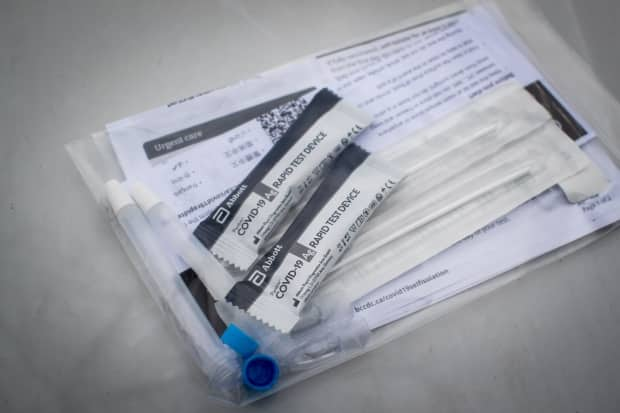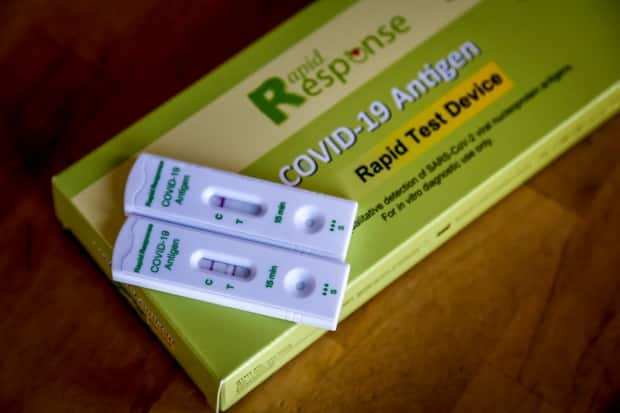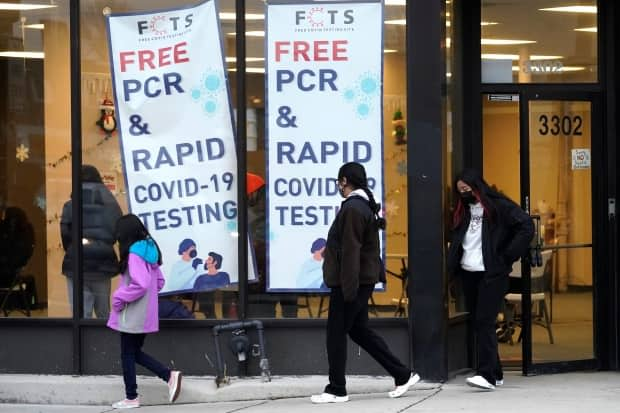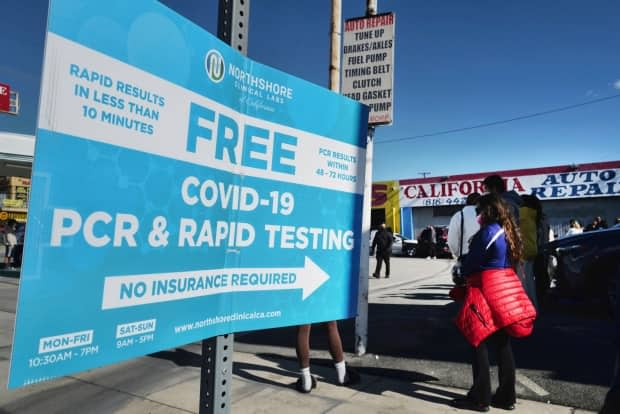As U.S. accelerates distribution of rapid tests, critics call on Ottawa to catch up

As Canadians grapple with the highly transmissible Omicron variant and a molecular testing regime that has all but collapsed, rapid antigen tests have become a much-needed lifeline — for those lucky enough to get their hands on one.
Canada is suffering a supply crunch, with nightmarishly long lines reported at the few sites where some provinces and territories have distributed tests to the general public.
So far, most of the provinces' tests have been earmarked for schools, businesses and long-term care homes, leaving people without a connection to these places in the lurch.
The few rapid tests offered for sale at pharmacies were quickly snapped up by people eager to learn their COVID status or to gather more safely with friends and family over the holidays. CBC News surveyed six pharmacies in the Ottawa and Toronto areas on Friday — at-home tests weren't available at any of these locations.
Many Canadians are now looking with envy at the relative abundance of rapid tests being distributed widely in the U.S. Experts here say the federal government should follow the example of the U.S. and other countries like Germany, Singapore and the United Kingdom by sending tests directly to people's homes to ensure more equitable access.
Have a coronavirus question or news tip for CBC News? Email ask@cbc.ca.

While U.S. President Joe Biden has conceded his administration should have ordered many more tests than it did initially — "If I had known, we would have gone harder, quicker," he recently said when pressed on testing gaps — the U.S. government pivoted quickly after the Omicron wave hit.
Washington launched a website this week that allows any American household to order up to four free tests by mail. Half a billion tests will be delivered by the U.S. Postal Service to doorsteps in the next seven to 12 days.
U.S. to distribute 875 million at-home tests
In addition to the half-billion tests being sent by mail, American retailers will have more than 375 million at-home rapid tests available for sale this month, according to data supplied by the White House. The Biden administration has demanded that health insurers cover the cost of these tests.
The tests can be purchased in the U.S. at pharmacies and big box stores like Walmart — where customers can buy two rapid antigen tests for just $17.98 US.
That means as many as 875 million at-home tests are being made available to American households this month alone. That's roughly three tests for every single person living in the U.S.
Millions more at-home COVID-19 tests have been delivered to thousands of community health centres and rural health clinics across the U.S. for distribution to patients. In addition to the at-home tests, there are now over 12,000 free testing sites across the U.S. ready to welcome patients for molecular PCR and rapid antigen testing.

In Canada, pandemic profiteers are offering tests for $80 or more on websites like Craigslist. Other online retailers, like Canadian Shield PPE, have pushed off promised deliveries until next month.
Ontario, the country's largest province, briefly opened rapid testing pop-up clinics over the holiday period before winding them down as supplies dwindled. Only one province — Nova Scotia — has been widely distributing rapid tests for months.
Dr. Dalia Hasan is a Kitchener, Ont.-based doctor who started COVID Test Finders, a grassroots social media-led initiative to connect Canadians with the limited supply of rapid tests.
'Free the RATs'
Hasan said her small outfit has been overwhelmed by requests from people desperate to get their hands on at-home tests as COVID-19 case numbers hit sky-high levels.
Hasan said she wants the federal government to start distributing tests directly to Canadians so that her group can stand down. She said it's not good enough to distribute tests to "small pockets" like schools and seniors' homes, leaving huge portions of the population without access.
Her petition calling on the government to "free the RATs" — an acronym for "rapid antigen tests" — has 75,000 signatures already.
"We urge the federal government to supply tests to every household in Canada. We can do it in Canada given we're so privileged to have a universal health care system," she told CBC News.

"We should be global leaders in the distribution of all public health tools to Canadians," Hasan said, adding that Canada Post, with its network of outlets in virtually every community in the country, is well-equipped to do the job. Rural and remote communities would benefit from such a system, as would people who don't have ready access to transportation, she said.
"It's frustrating to me and every Canadian that rapid tests are very difficult to get," she said.
Hasan said an abundance of rapid tests would help fight the spread of the virus by breaking the chain of transmission, allow COVID-infected people to safely leave isolation after a string of negative test results and expand access to Pfizer's recently approved oral antiviral, Paxlovid, which requires a positive test result before use.
"The COVID virus is lethal and very dangerous because it's invisible and rapid tests allow us to remove that invisibility cloak and detect it in 15 minutes. So underutilizing tests — it's a problem," she said. "They're a critical tool to safeguard our community."
Canadian officials have talked down the value of rapid tests in the past. Patty Hajdu, the former federal health minister, initially questioned the accuracy of these diagnostic tools and Anita Anand, the former procurement minister, said antigen tests would not replace the "gold standard" lab-based PCR testing.
But with the PCR testing system in crisis, the federal government has rushed in recent weeks to snap up as many test kits as it can.
Most provinces and territories have curbed PCR testing during the Omicron wave — restricting access to high-risk groups like health care workers and people in long-term care homes due to a shortage of laboratory capacity and a staffing crunch.
Millions of tests destined for Canada, health minister says
Earlier this month, Health Minister Jean-Yves Duclos said the government is procuring 140 million more tests from Health Canada-approved suppliers to bolster provincial supply chests that are running low.
"We're going to make sure every province and territory, and therefore every person in Canada, wherever that person may live, will have access to a safe amount of rapid tests," Duclos said on Jan. 7.
And while Duclos promised 140 million tests "this month," provinces aren't seeing seeing that kind of volume roll in — and the month is almost over.
Ontario was promised 54.3 million tests (it asked for 68.6 million); only six million have arrived so far. Another eight million have "scheduled delivery dates" but the delivery status of the other tests is unknown, said Alexandra Hilkene, a spokesperson for Ontario Health Minister Christine Elliott.

A spokesperson for federal Procurement Minister Filomena Tassi said millions of tests from 14 different suppliers have arrived, with more expected in the coming days as Ottawa enters the "surge buying" phase.
It's hard to say just how many tests have arrived so far because it "changes by the hour," James Fitz-Morris told CBC News.
"We pretty much have tests arriving everyday. We've got Antonovs loaded with them coming in," he said, referring to the cargo planes used to carry some of these goods.
Send at-home tests via Canada Post: doctor
Unlike the vaccine procurement effort, the federal government is taking more of a hands-off approach to rapid test distribution. It's directing major suppliers like Abbott Laboratories to ship these tests directly to provincial warehouses where local officials can decide how best to deploy them, he said.
In a note to customers this week, Canadian Shield PPE — a Waterloo, Ont.-based company that supplies everything from air filtration systems to face masks, shields and rapid tests — said aggressive government procurement has left it with few tests for their customers. The company said it expects to have its delivery schedules back to normal next month.
Fitz-Morris conceded the federal effort to buy up as many tests as possible has left some private retailers struggling to meet demand.
"We're conscious of the disruptions that all of our purchases are causing," he said, adding that the large multinationals churning out these tests would rather deal with a big bulk buyer like the federal government.
As for the idea of shipping tests directly to households through Canada Post, Fitz-Morris said Canada's cold climate would complicate that effort.
"These things can freeze so putting them in the mail in the winter in Canada ... they'll be ruined," he said.
It's an issue in some of the northern U.S. states as well, where temperatures aren't all that much higher than in Canada in winter.
WATCH: How to use a rapid test
A spokesperson for Abbott said its popular BinaxNOW rapid test — one of the devices being shipped by the U.S. Postal Service this month — should be stored at temperatures between 2 C and 30 C.
"But if the test is stored outside the temperature range for a relatively short period of time — or a couple of hours, up to a day or two — it will be fine to use. And it's important that this test and its components are used at room temperature," the spokesperson said.
Hasan, the doctor behind COVID Test Finders, said cold weather conditions are already an issue for people receiving tests in the mail from private sellers.
If Canada Post is concerned about damaging the product, it could require a signature upon delivery or allow people to pick up the kits at a temperature-controlled post office.
"The government needs to step up. They're the ones that have all the resources and the experts to distribute these rapid tests on a wider scale," she said.

 Yahoo Movies
Yahoo Movies 
